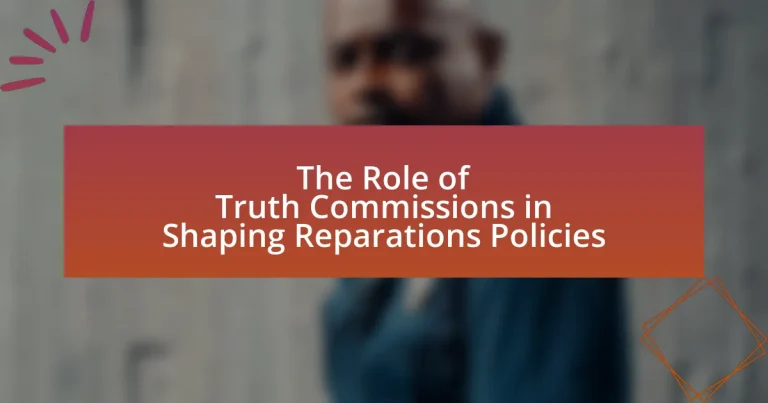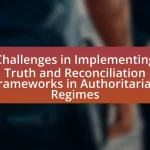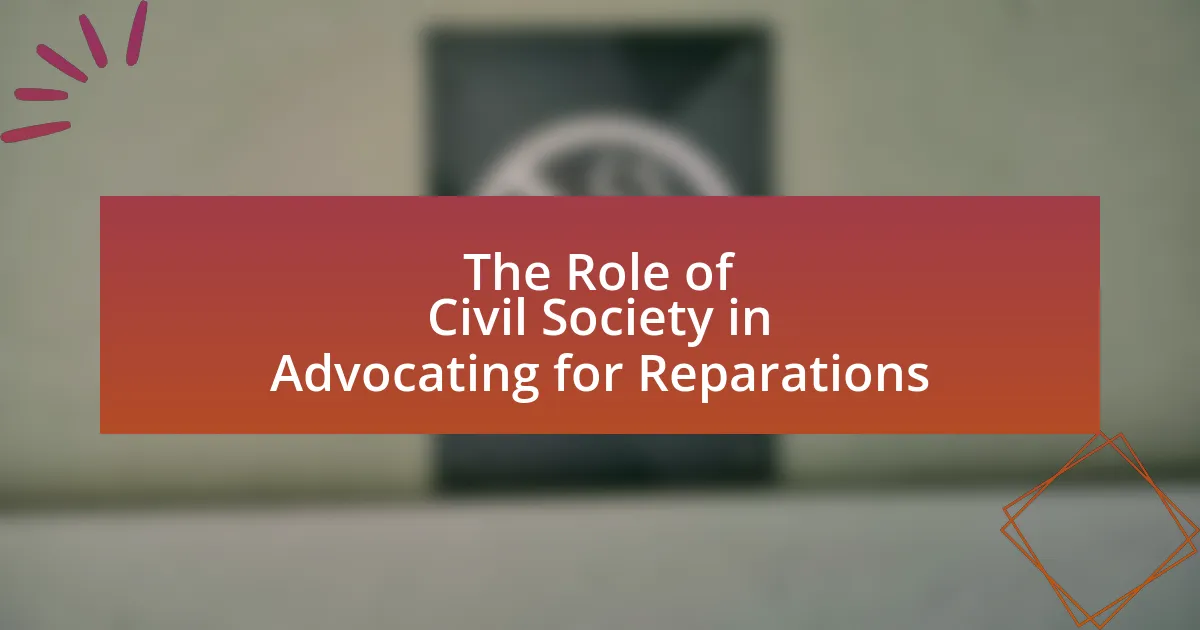Truth commissions are official bodies established to investigate human rights violations and injustices during periods of conflict or authoritarian rule, with the primary aim of uncovering the truth, promoting accountability, and fostering reconciliation. This article explores the operational mechanisms of truth commissions, their key functions, and their significance in addressing historical injustices and shaping reparations policies. It examines how truth commissions gather and analyze information, the types of reparations they recommend, and the challenges they face in implementation. Additionally, the article highlights the importance of public engagement and international support in enhancing the effectiveness of reparations initiatives, providing insights into best practices for successful outcomes.
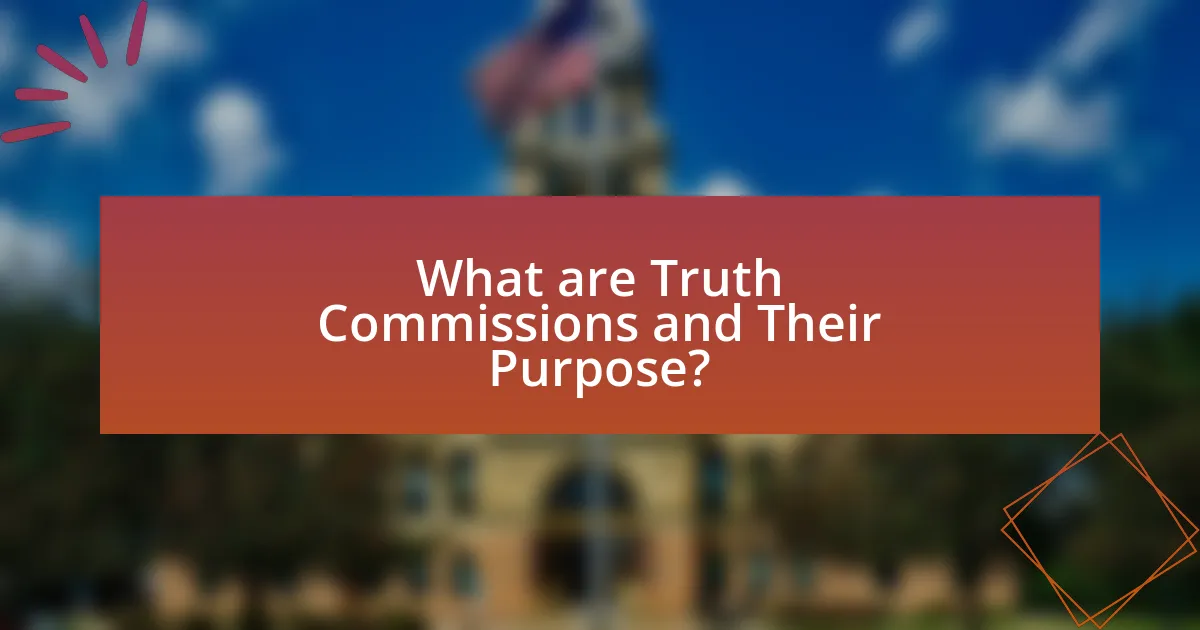
What are Truth Commissions and Their Purpose?
Truth commissions are official bodies established to investigate and report on human rights violations and injustices that occurred during periods of conflict or authoritarian rule. Their primary purpose is to uncover the truth about past abuses, promote accountability, and foster reconciliation within societies. For instance, the South African Truth and Reconciliation Commission, established in 1995, aimed to address the atrocities committed during apartheid, providing a platform for victims to share their experiences and for perpetrators to confess their crimes in exchange for amnesty. This process not only documented historical injustices but also informed reparations policies aimed at healing and restoring trust in the community.
How do Truth Commissions operate in different contexts?
Truth Commissions operate by investigating past human rights violations and fostering national reconciliation, with their functioning varying based on the political, social, and historical contexts of the countries in which they are established. For instance, in South Africa, the Truth and Reconciliation Commission was created post-apartheid to address systemic injustices and promote healing through public testimonies, while in Guatemala, the Historical Clarification Commission focused on documenting the atrocities of the civil war to acknowledge victims and promote accountability. These commissions often utilize public hearings, victim testimonies, and archival research to gather evidence and provide recommendations for reparations, reflecting the unique societal needs and historical grievances of each context.
What are the key functions of Truth Commissions?
Truth Commissions primarily serve to investigate and document human rights violations, promote accountability, and foster reconciliation in post-conflict societies. They gather testimonies from victims and perpetrators, creating an official record of abuses, which can help validate the experiences of victims and provide a basis for reparations. For instance, the South African Truth and Reconciliation Commission, established in 1995, aimed to address the atrocities of apartheid by uncovering the truth about past abuses, which informed subsequent reparations policies. Additionally, Truth Commissions often recommend measures to prevent future violations, contributing to the establishment of a more just and equitable society.
How do Truth Commissions gather and analyze information?
Truth Commissions gather and analyze information through a systematic process that includes collecting testimonies, reviewing documents, and conducting investigations. They often hold public hearings where victims and witnesses provide accounts of human rights violations, which are recorded and transcribed for analysis. Additionally, commissions may access government archives, legal documents, and other relevant materials to corroborate testimonies and establish a factual basis for their findings. For example, the South African Truth and Reconciliation Commission utilized over 20,000 statements from victims and perpetrators, which were analyzed to create a comprehensive report on apartheid-era abuses. This methodical approach ensures that the information gathered is both credible and comprehensive, allowing for informed recommendations on reparations and policy changes.
Why are Truth Commissions important for societies?
Truth Commissions are important for societies because they facilitate the acknowledgment of past human rights violations and promote healing and reconciliation. By investigating and documenting abuses, Truth Commissions provide a platform for victims to share their experiences, which helps to validate their suffering and fosters a collective memory. For instance, the South African Truth and Reconciliation Commission, established in 1995, played a crucial role in addressing the atrocities of apartheid, leading to a national dialogue about justice and forgiveness. This process not only aids in societal healing but also lays the groundwork for reparations policies by identifying the needs of victims and recommending measures for redress.
What role do they play in addressing historical injustices?
Truth commissions play a crucial role in addressing historical injustices by investigating and documenting human rights violations, thereby promoting accountability and reconciliation. They provide a platform for victims to share their experiences, which helps to validate their suffering and fosters societal acknowledgment of past wrongs. For instance, the Truth and Reconciliation Commission in South Africa documented atrocities committed during apartheid, leading to public awareness and policy changes aimed at reparations. This process not only aids in healing but also informs reparations policies by highlighting the need for compensation and support for affected communities.
How do Truth Commissions contribute to national reconciliation?
Truth Commissions contribute to national reconciliation by uncovering the truth about past human rights violations and fostering dialogue among affected communities. They provide a platform for victims to share their experiences, which helps to acknowledge suffering and validate the narratives of those impacted. For instance, the South African Truth and Reconciliation Commission, established in 1995, facilitated public hearings that allowed victims to recount their stories, promoting healing and understanding. This process not only aids in restoring dignity to victims but also encourages societal reflection on injustices, ultimately paving the way for restorative justice and policy reforms aimed at preventing future violations.
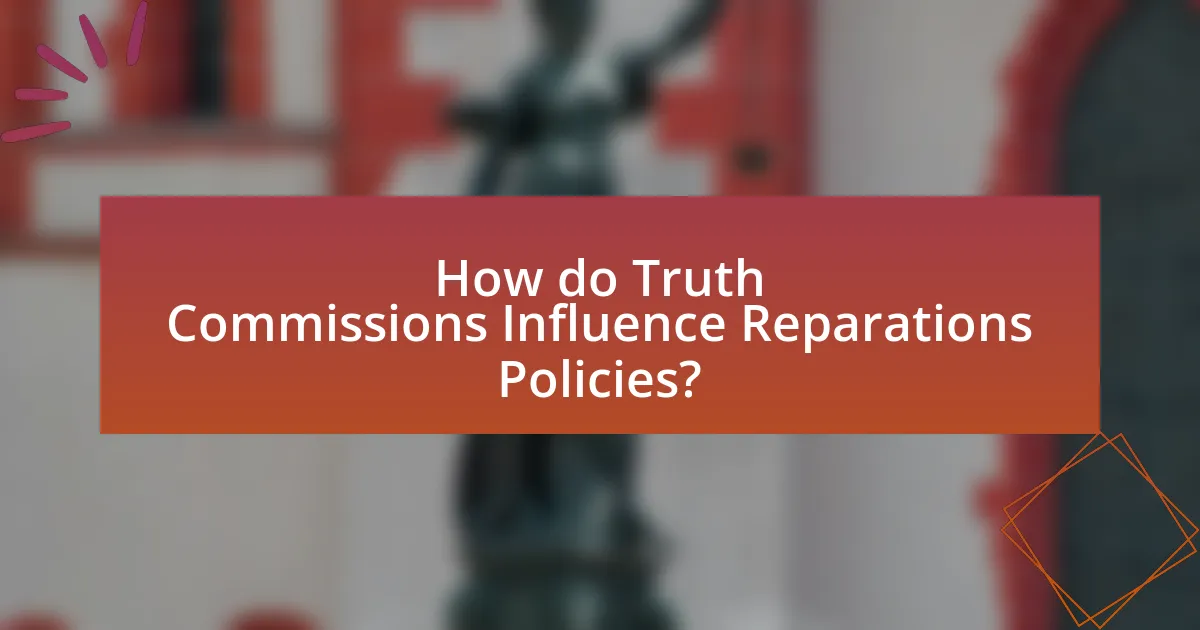
How do Truth Commissions Influence Reparations Policies?
Truth commissions influence reparations policies by establishing a historical record of human rights violations, which informs the scope and nature of reparations. These commissions gather testimonies and evidence, creating a comprehensive account of abuses that victims endured, which can serve as a basis for determining the types of reparations needed. For instance, the South African Truth and Reconciliation Commission documented extensive human rights violations during apartheid, leading to the establishment of a reparations fund that provided financial compensation and support services to victims. This process demonstrates how truth commissions can legitimize claims for reparations and guide policymakers in addressing the needs of affected communities.
What is the relationship between Truth Commissions and reparations?
Truth Commissions and reparations are interconnected mechanisms aimed at addressing historical injustices and promoting reconciliation. Truth Commissions investigate and document human rights violations, providing a factual basis that can inform reparations policies. For instance, the South African Truth and Reconciliation Commission’s findings led to the establishment of reparations for victims of apartheid, demonstrating how the commission’s work directly influenced the reparative measures taken by the government. This relationship underscores the importance of truth-telling in shaping effective reparations that acknowledge and address the harms suffered by individuals and communities.
How do findings from Truth Commissions inform reparations decisions?
Findings from Truth Commissions inform reparations decisions by providing a documented account of human rights violations and the impact on victims. These commissions gather testimonies, evidence, and historical context, which help to identify the specific harms suffered by individuals and communities. For instance, the South African Truth and Reconciliation Commission’s findings led to the establishment of a reparations fund that compensated victims of apartheid, demonstrating how documented injustices directly influenced financial and policy decisions regarding reparations. This evidence-based approach ensures that reparations are aligned with the needs and experiences of those affected, thereby enhancing the legitimacy and effectiveness of reparative measures.
What types of reparations are commonly recommended by Truth Commissions?
Truth Commissions commonly recommend several types of reparations, including financial compensation, restitution of property, rehabilitation services, and public acknowledgment of harm. Financial compensation aims to provide victims with monetary support for their suffering, while restitution involves returning property or assets taken during conflicts. Rehabilitation services focus on medical, psychological, and social support to help victims recover. Public acknowledgment includes official apologies and memorialization efforts to recognize the injustices faced by victims, which is essential for societal healing and reconciliation. These recommendations are based on the principles of justice and accountability, as seen in various Truth Commission reports, such as the South African Truth and Reconciliation Commission, which emphasized the importance of reparations in addressing past wrongs.
Why is public engagement crucial in shaping reparations policies?
Public engagement is crucial in shaping reparations policies because it ensures that the voices and experiences of affected communities are heard and integrated into the decision-making process. This involvement fosters transparency and accountability, which are essential for building trust between policymakers and the communities they serve. Historical examples, such as the South African Truth and Reconciliation Commission, demonstrate that inclusive public dialogue can lead to more effective and accepted reparations frameworks, as it allows for a diverse range of perspectives and needs to be considered. Engaging the public also helps to legitimize the reparations process, as it reflects a collective acknowledgment of past injustices and a commitment to addressing them.
How do Truth Commissions facilitate community involvement in reparations?
Truth Commissions facilitate community involvement in reparations by creating platforms for dialogue, allowing victims and community members to share their experiences and needs. These commissions often conduct public hearings where individuals can testify about their suffering, which helps to validate their experiences and inform reparations policies. For instance, the South African Truth and Reconciliation Commission engaged communities through public hearings, leading to the development of reparations that addressed specific community needs, such as housing and education. This process not only empowers communities but also ensures that reparations are tailored to the actual impacts of past injustices, thereby enhancing their effectiveness and relevance.
What impact does public opinion have on reparations outcomes?
Public opinion significantly influences reparations outcomes by shaping political will and policy decisions. When a majority of the public supports reparations, it creates pressure on lawmakers to enact policies that address historical injustices. For instance, surveys indicate that in the United States, support for reparations among the general population has fluctuated, impacting legislative discussions and proposals. In 2020, a Gallup poll showed that 76% of Black Americans favored reparations, while only 18% of white Americans supported the idea, illustrating how demographic perspectives can affect the feasibility of reparations initiatives. This disparity in public opinion can lead to stalled or accelerated reparations efforts, depending on the prevailing attitudes within society.
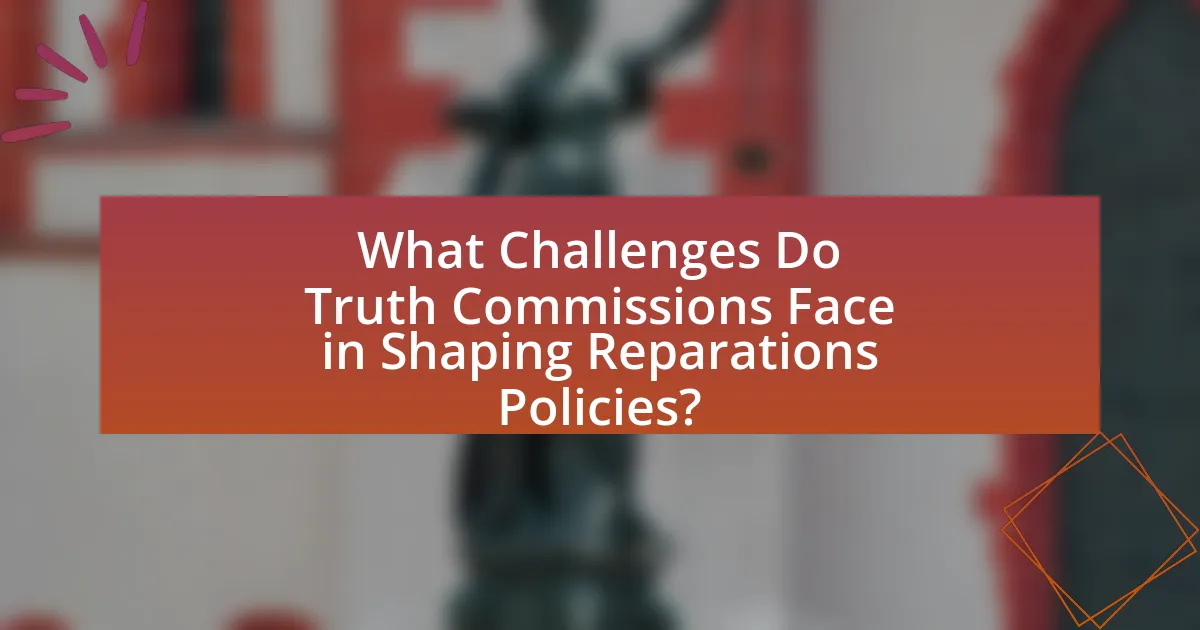
What Challenges Do Truth Commissions Face in Shaping Reparations Policies?
Truth commissions face significant challenges in shaping reparations policies, primarily due to political resistance, limited resources, and the complexity of addressing diverse victim needs. Political resistance often arises from governments that may be reluctant to acknowledge past atrocities or allocate funds for reparations, as seen in countries like South Africa, where the Truth and Reconciliation Commission faced pushback from political factions. Limited resources hinder the ability of truth commissions to conduct thorough investigations and implement comprehensive reparations programs, as evidenced by the financial constraints faced by the Guatemalan Commission for Historical Clarification. Additionally, the complexity of addressing the varied needs of victims complicates the formulation of equitable reparations policies, as different groups may have distinct experiences and expectations, which was a challenge noted in the case of the Sierra Leone Truth and Reconciliation Commission.
What are the common obstacles encountered by Truth Commissions?
Truth Commissions commonly encounter obstacles such as lack of political will, insufficient funding, and societal resistance. Lack of political will often manifests when governments are unwilling to support the commission’s findings or implement recommendations, as seen in the case of the South African Truth and Reconciliation Commission, where political factions resisted accountability measures. Insufficient funding can hinder the commission’s ability to conduct thorough investigations and outreach, limiting its effectiveness, as evidenced by the budget constraints faced by the Guatemalan Historical Clarification Commission. Societal resistance may arise from communities that are divided over the commission’s purpose or findings, which can lead to tensions and undermine the commission’s credibility, as observed in various post-conflict societies.
How do political dynamics affect the implementation of reparations?
Political dynamics significantly influence the implementation of reparations by determining the willingness of governments to acknowledge historical injustices and allocate resources for reparative measures. For instance, in countries where political leadership is sympathetic to marginalized communities, such as South Africa post-apartheid, reparations were more readily pursued through the Truth and Reconciliation Commission, which recommended reparative actions. Conversely, in nations where political power is concentrated among groups that oppose reparations, such as in the United States regarding slavery reparations, legislative efforts face substantial resistance, limiting the scope and effectiveness of potential reparative policies. This relationship between political will and reparations is evident in various historical contexts, where the alignment or conflict of political interests directly impacts the feasibility and implementation of reparative justice initiatives.
What role does funding play in the effectiveness of Truth Commissions?
Funding is crucial for the effectiveness of Truth Commissions as it directly impacts their operational capacity, scope, and ability to engage with victims and communities. Adequate financial resources enable Truth Commissions to conduct thorough investigations, provide necessary support services to victims, and ensure transparency and credibility in their processes. For instance, the South African Truth and Reconciliation Commission received significant funding, which allowed it to effectively gather testimonies and facilitate public hearings, ultimately contributing to national healing and reconciliation. Conversely, insufficient funding can lead to limited outreach, inadequate staffing, and compromised investigative rigor, undermining the Commission’s objectives and public trust.
How can Truth Commissions overcome these challenges?
Truth Commissions can overcome challenges by ensuring inclusive participation, establishing clear mandates, and fostering transparency in their processes. Inclusive participation allows diverse voices, particularly marginalized groups, to contribute, which enhances legitimacy and comprehensiveness. Clear mandates provide a focused framework for investigations, helping to avoid scope creep and ensuring that the commission’s objectives are met efficiently. Transparency in processes builds public trust and encourages cooperation from witnesses and victims, which is crucial for gathering accurate testimonies. Historical examples, such as the South African Truth and Reconciliation Commission, demonstrate that these strategies can lead to successful outcomes by promoting healing and accountability in post-conflict societies.
What best practices can enhance the effectiveness of Truth Commissions?
Best practices that can enhance the effectiveness of Truth Commissions include ensuring broad public participation, maintaining independence from political influence, and providing adequate resources for investigations. Broad public participation fosters trust and legitimacy, as seen in South Africa’s Truth and Reconciliation Commission, which engaged diverse communities to gather testimonies. Independence from political influence is crucial for impartiality; for instance, the Peruvian Truth and Reconciliation Commission operated with autonomy, allowing it to address human rights violations without governmental interference. Adequate resources, including funding and trained personnel, are essential for thorough investigations, as demonstrated by the successful documentation efforts of the Chilean National Commission on Truth and Reconciliation. These practices collectively contribute to the credibility and impact of Truth Commissions in shaping reparations policies.
How can international support strengthen reparations initiatives?
International support can strengthen reparations initiatives by providing financial resources, technical expertise, and global advocacy that enhance the effectiveness and reach of these programs. For instance, countries that have experienced conflict or systemic injustice often lack the necessary funding to implement comprehensive reparations programs; international donors can fill this gap, as seen in post-apartheid South Africa, where international funding supported the Truth and Reconciliation Commission’s efforts. Additionally, international organizations can offer best practices and frameworks that guide local initiatives, ensuring they are equitable and just. Furthermore, global advocacy can raise awareness and pressure governments to fulfill their reparative obligations, as demonstrated by the international attention on reparations for slavery and colonialism, which has led to increased dialogue and policy considerations in various nations.
What are the key takeaways for implementing effective reparations policies?
Key takeaways for implementing effective reparations policies include establishing a clear legal framework, ensuring community involvement, and providing adequate funding. A clear legal framework is essential to define eligibility and the scope of reparations, as seen in South Africa’s Truth and Reconciliation Commission, which laid the groundwork for reparative measures. Community involvement is crucial for addressing the specific needs and historical contexts of affected populations, as demonstrated by the participatory approaches in countries like Canada with Indigenous communities. Adequate funding ensures that reparations are sustainable and impactful, as evidenced by the financial commitments made in Germany for Holocaust reparations, which have provided long-term support to survivors.
